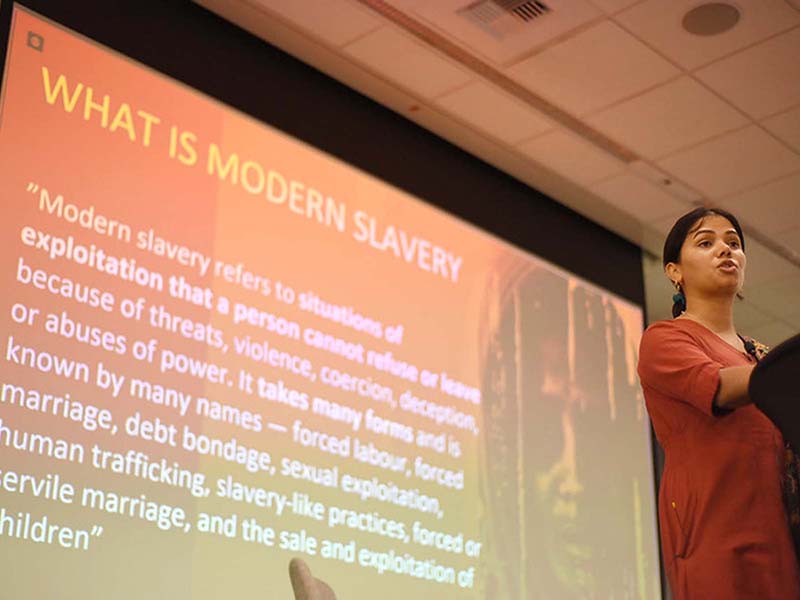Introduction
BSR worked with The Bank of Nova Scotia (Scotiabank) to refresh its Human Rights Assessment (HRA) and update its Human Rights Statement. This work served as a foundation to develop a forward-looking and actionable human rights strategy to navigate emerging, existing, and potential human rights challenges and opportunities.
As a member of BSR and its Human Rights Working Group, Scotiabank’s ongoing partnership with BSR enabled the Bank to advance its commitment to respect human rights in its own operations and across its value chain.
Background
Scotiabank offers a broad range of advice, products, and services, including personal and commercial banking, wealth management and private banking, corporate and investment banking, and capital markets. Scotiabank's team of almost 90,000 employees serves more than 25 million customers across its global footprint.
As a financial services provider, Scotiabank recognizes its obligations and responsibilities to respect the human rights of its employees, customers, and individuals and communities affected by its operations, business relationships, products, and services. Aligning Scotiabank’s activities with the framework established by the UN Guiding Principles on Business and Human Rights (UNGPs) continues to be a growing priority for the Bank. As part of this work, and in the face of increasing global regulatory and stakeholder pressures, Scotiabank sought BSR’s human rights and financial services expertise to work toward the following goals:
- Update Scotiabank’s Human Rights Statement to reflect global trends and stakeholder expectations.
- Improve awareness of the Bank's human rights commitments internally and externally.
- Identify the Bank’s most salient human rights issues and provide recommendations to address and mitigate them.
- Establish a systematic process to assess the effectiveness of actions taken to address human rights issues.
- Increase transparency on Scotiabank’s human rights disclosures to align with growing stakeholder expectations.
- Strive to embed the UNGPs into Scotiabank’s global operations and value chain.
The Challenge
Under the UNGPs, companies, such as Scotiabank, have the responsibility to respect human rights within their own operations and value chain, including the consideration of human rights issues through business relationships, products, and services.
Banks play an important role in our global economy. However, there are multiple ways in which the sector is exposed to salient and significant human rights issues through its operations, supply chains, and business relationships. With increasing stakeholder expectations and greater regulatory requirements on human rights, financial institutions must develop proactive and strategic approaches to identify, address, and mitigate their exposure to key human rights issues in all facets of their business, including but not limited to corporate and retail lending, asset management, and investment banking.
Building on BSR’s first HRA for the Bank in 2016, which informed a four-year strategy and was done in partnership with the Danish Institute for Human Rights, Scotiabank chose to refresh its assessment and strategy to validate and update its salient human rights issues and continue to proactively manage human rights risks and impacts.
BSR’s Approach
In 2020-2021, the Bank commissioned BSR for a second time to conduct a comprehensive HRA to help Scotiabank advance its commitment to prevent and address adverse human rights risks and impacts and improve policies and due diligence processes. The HRA included interviews with more than 50 internal and external stakeholders, an extensive review of internal and publicly available materials, an analysis of regulatory developments, and a human rights salience assessment. Drawing on findings and international human rights standards, BSR identified Scotiabank’s most salient human rights issues across the Bank’s operations or business relationships, products, and services (e.g., lending and investment activity).
Using a proprietary salience assessment tool tailored to Scotiabank’s operations and value chain, BSR analyzed and prioritized relevant human rights risks and impacts based on criteria in the UNGPs, resulting in a priority list of 13 salient human rights issues for Scotiabank to monitor and manage as part of its renewed human rights strategy.
BSR then developed tailored recommendations on the order in which Scotiabank should address their most salient issues and highlighted areas that should be prioritized, including issues that the Bank is directly linked to via business relationships (e.g., clients and suppliers). BSR proposed areas for further action, including updating the Bank’s Human Rights Statement, reviewing existing mechanisms for identifying grievances and providing access to remedy, and exploring additional regional and issue-based actions.
Building on the findings from the HRA, BSR worked with Scotiabank to refresh its human rights strategy, which included incorporating an updated vision statement, integrating the identified salient issues, developing goals for each issue, and identifying issue owners. After developing a strategic framework, BSR facilitated 10 action planning workshops with internal representatives of key functions/departments to gather insights on the current management approach, present best practice examples, and develop strategic recommendations for each prioritized human rights issue.
Concurrently, BSR also assisted Scotiabank in updating its Human Rights Statement, reviewing it against UNGP expectations, benchmarking against peer companies, and providing recommendations based on identified gaps.
Impact and Implementation
Upon completion of the project, Scotiabank had an updated Human Rights Statement with stronger alignment to the UNGPs and corporate human rights criteria and a refreshed human rights strategy that addressed the Bank's most salient issues. Through BSR’s facilitated collaboration with key stakeholders (e.g., employees, NGOs, investors), Scotiabank was able to deepen its understanding of human rights issues, which contributed to building the capacity of internal functions, (e.g., Human Resources, Risk, Legal, Data Ethics) on the UNGPs, findings from the HRA, and best practices in the banking industry. This workstream helped to outline ownership and governance-related responsibilities across relevant teams to contribute to the implementation of the recommendations from the HRA and management and mitigation of Scotiabank's most salient human rights issues.
“At Scotiabank, respect for human rights is fundamental to the way we do business and core to our values. Our refreshed human rights strategy, and the BSR-facilitated workshops that led to its creation, helped us reengage internal stakeholders in meaningful and updated dialogue aligning on clear priorities to advance our human rights commitments.”
Maria Saros, Vice President and Global Head, Social Impact
Conclusion
In light of the shifting regulatory environment and stakeholder pressures globally, Scotiabank and other financial institutions are increasingly recognizing the need and strategic value of developing a comprehensive approach to human rights.
Robust human rights policies and HRAs are the building blocks of an effective human rights approach, providing financial institutions with a framework and systematic due diligence tools to assess and address human rights risks and impacts associated with their operations, business relationships, products, and services and meet their responsibilities to respect human rights under the UNGPs. Equally as important, the UNGPs and emerging regulations expect financial institutions to act on HRA findings with achievable timelines, track performance and assess the effectiveness of their actions, communicate how they are mitigating and managing their identified salient human rights issues, and provide access to remedy when harm occurs.
By adopting a strategic approach to respecting human rights, financial institutions can proactively adapt to address human rights risks and impacts and leverage opportunities within their business strategy and risk management systems to meet expectations from key stakeholders, align with the UNGPs, and manage key reputational, financial, and legal risks.
“Our human rights commitments guide our business governance and management and have wide-ranging impacts across the organization. Our Human Rights Assessment and our updated Human Rights Strategy have helped us proactively formalize a new roadmap for Scotiabank to strategically address and mitigate salient human rights impacts throughout our value chain.”
Meigan Terry, Senior Vice President and Chief Sustainability, Social Impact and Communications Officer
Get in Touch
This case study was written by Megan Coffey and Kindra Mohr. For more information on how BSR works with financial institutions to advance human rights in operations, investment portfolios, and value chains, please contact our human rights and financial services teams.
Let’s talk about how BSR can help you to transform your business and achieve your sustainability goals.








